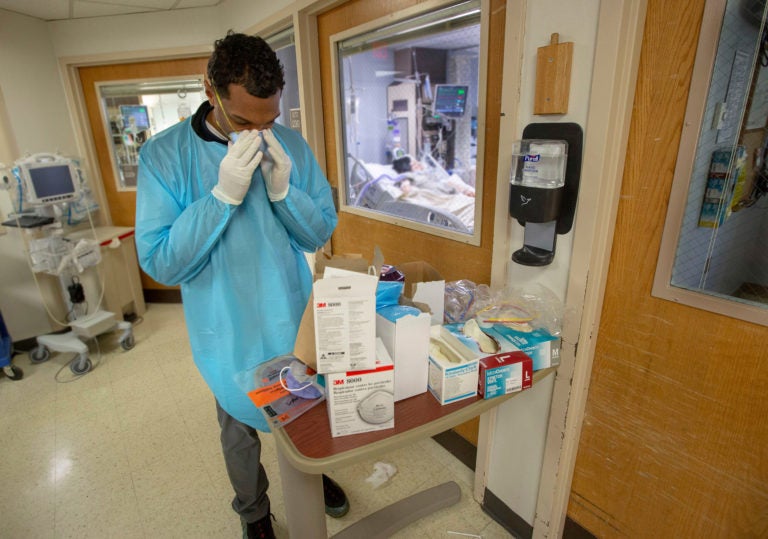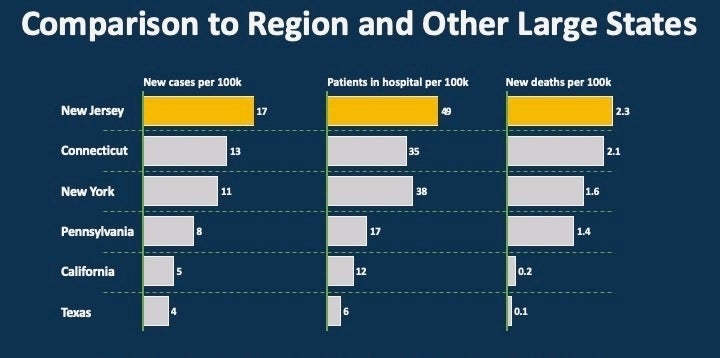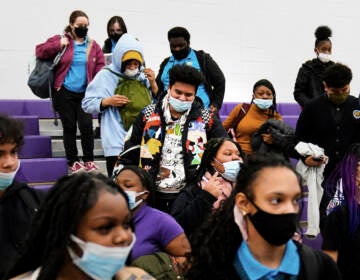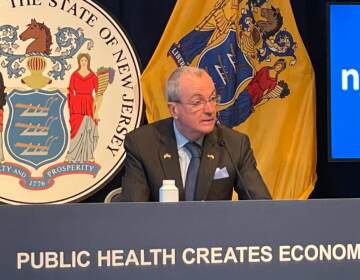Coronavirus update: N.J. opens registration for up to 5,000 contact tracers
The state also committed to testing all residents and staff at some 670 nursing homes over the next two weeks.

Dr. Clenton Coleman adjusts his mask inside the ICU of Holy Name Medical Center in Teaneck, New Jersey, March 19, 2020. (Jeff Rhode /Holy Name Medical Center)
Are you on the front lines of the coronavirus? Help us report on the pandemic.
New Jersey reported 898 new coronavirus cases Tuesday, bringing the state’s total to 140,743. Gov. Phil Murphy said the last time New Jersey reported fewer than 1,000 new cases in a day was March 25.
Another 198 people died of complications from COVID-19. The state has now lost 9,508 residents to the pandemic.
N.J. to ramp up testing, contact tracing
New Jersey leaders say the state will be able to perform at least 20,000 COVID-19 tests a day by the end of May — nearly twice the roughly 12,000 daily tests administered at the end of April. The added testing lays the groundwork for a giant contact tracing program in the works, they said Tuesday.
Health Commissioner Judith Persichilli said the state will need to hire up to 5,000 people to identify and notify those who have come into contact with infected individuals. Murphy said such workers would be paid $25 an hour and invited interested residents to register on the state website.
“Until there is a proven vaccine or even a proven therapeutic, the best chance at catching and containing this virus is through testing and contact tracing,” Murphy said at his daily coronavirus briefing.
Neither Murphy nor Persichilli said when the contact tracing system would be up and running at scale.
Asked about privacy concerns, State Epidemiologist Dr. Christina Tan said the identity of infected individuals is not shared with potential contacts in the course of routine contact tracing.
Universal testing at nursing homes
All residents and staff at New Jersey’s roughly 670 nursing homes and other long-term care facilities will be tested no later than May 26, Murphy said Tuesday.
Universal testing is also planned or already underway for other vulnerable populations, including residents at state psychiatric hospitals and developmental centers and seasonal farmworkers.
Officials hope the testing can help prevent the type of unchecked outbreaks that have already ravaged dozens of nursing and veterans homes throughout the state.
More than half of all COVID-19 deaths in New Jersey have occurred at long-term care facilities, a proportion far larger than the national average of about one-third.
State Attorney General Gurbir Grewal has launched a probe into the industry.
Tale of two slides
New Jersey’s efforts to flatten the curve have been “a huge success story,” but the state also has a long way to go, Murphy said Tuesday using a pair of PowerPoint slides.
The first showed that hospitalizations, patients in critical care, new daily cases and daily deaths have all come down significantly from their respective peaks in April.
“The progress is undeniable, both from peak and since only a couple weeks ago,” Murphy said.

But the next slide showed that the impact of the virus using several key measurements is still worse in New Jersey than in any other state.
“Those numbers don’t lie,” Murphy said. “We are still the most impacted state in America.”

Murphy still hasn’t said when the rate of new infections will be low enough that the state can begin to reopen in earnest.
Instead, he has advocated for a slow reopening of the state economy and has resisted calls to commit to a firm timeline for lifting stay-at-home restrictions.
Majority agree with pace of reopening
On that point, two-thirds of New Jerseyans think the state is moving at the right pace to lift stay-at-home restrictions and reopen businesses, according to a new Rutgers-Eagleton poll.
Some 16% of respondents said the state is moving too slowly, while 19% said it’s moving too quickly.
Republicans are far more likely than Democrats — 35% to 4% — to favor a faster timeline.
The survey also found that Black and Hispanic residents, as well as low-income individuals, are more acutely concerned about the consequences of coronavirus than their wealthier, white counterparts.
By double digits, more Black and Hispanic than white residents said they are “very worried” about a household member getting sick from COVID-19, obtaining a test if needed, getting laid off from work, being able to pay monthly bills, buying food and seeing their local hospitals run out of necessary equipment.
Municipal courts resume hearing all cases
New Jersey’s 515 municipal courts can resume hearing cases of all types this week, about two months after sessions were suspended due to the coronavirus outbreak.
But limitations remain. All cases must be heard via video or phone, and New Jersey Supreme Court Chief Justice Stuart Rabner said in an order that they can proceed only “to the extent possible based on facilities, technology, and other resources.”
Jury trials and grand jury proceedings, which are conducted in person, remain suspended through at least May 31.
Municipal courts in New Jersey handle some 6 million cases in a typical year.
WHYY is your source for fact-based, in-depth journalism and information. As a nonprofit organization, we rely on financial support from readers like you. Please give today.



![CoronavirusPandemic_1024x512[1]](https://whyy.org/wp-content/uploads/2020/03/CoronavirusPandemic_1024x5121-300x150.jpg)



